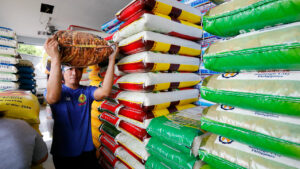
All eyes on lack of storage, logistics costs as food drives Philippine inflation
By Kyle Aristophere T. Atienza, Reporter
THE MARCOS administration should work with the private sector in cutting logistics costs while building more storage facilities nationwide to ease the impact of rising prices, economists said.
An archipelagic nation like the Philippines should ensure that storage facilities for basic commodities such as rice and vegetables, as well as logistics networks, are “sufficient and working well,” Genny F. Lapina, an agricultural economist at the University of the Philippines Los Baños (UPLB), said in an e-mail.
“It will be useful to have the private sector as a partner because the government cannot provide all the logistics and storage requirements of the country,” he said.
Inflation accelerated for the first time in five months to 3.4% in February, mainly due to rising food prices.
In particular, rice inflation quickened to 23.7% in February from 22.6% in January, the fastest since 24.6% in February 2009.
Mr. Lapina said the food-driven inflation should be addressed by ensuring the country has enough supply. He said the government is struggling to strike a balance between prioritizing local producers and using imports to address supply issues.
“Our agriculture sector is also facing El Niño, which means crops are affected differently. In the case of rice, there is a concern that palay production may be negatively affected due to less water availability,” he said.
The Philippine disaster council on Wednesday said El Niño’s damage to agriculture had already hit over P1 billion.
On Thursday, the state weather bureau said El Niño has started to weaken and that it might return to its normal condition between April and June. However, an increasing probability of La Niña may develop two months into August.
Mr. Lapina said the government has been increasing its support for agriculture but it has been mainly directed toward rice.
“A tradeoff is that we are unable to support other traditional crops that may be good for food security and help us be more resilient given climate change and multiple challenges that can affect our domestic food system,” he said.
He also called for more government funding for research as a long-term solution to farm productivity issues.
Amid the surprise reacceleration in February inflation, there have been questions on whether the central bank still needs to increase borrowing costs. The Bangko Sentral ng Pilipinas (BSP) kept its benchmark rate steady at a near 17-year high of 6.5% in February for a third straight meeting.
“The BSP implements monetary policy actions to forestall second-round effects of supply-side issues, while recognizing that this is an imperfect approach,” Bruce J. Tolentino, the private sector’s representative to the Monetary Board, said in an X (formerly Twitter) message.
BSP Governor Eli M. Remolona, Jr. on Wednesday said it’s too early to declare victory over inflation, citing upside risks from rice prices and potential wage hikes.
On the issue of rising rice prices, Mr. Tolentino said improving farmer productivity and income as well as expanding irrigation systems are needed.
“The only sustainable way to do that is to ensure that farmers have access to, and use, improved seeds and biotechnology,” he said. “[These] programs should be started immediately and continued into the medium and long terms.”
Mr. Tolentino said domestic productivity improvements take time, so the government should focus on consumer access to “competitively priced food, and also manage inflation.”
“The moves to establish trade agreements with Vietnam and Cambodia, and also with India, are good,” he added, citing the need to remove trade barriers.
Raul Montemayor of the Federation of Free Farmers said: “As usual, one-track mind — import, import, import.”
Jayson C. Cainglet of the Samahang Industriya ng Agrikultura lamented that the country has been under a low-tariff regime for the past three years but “prices have never gone down.”
“It does not benefit the consumers and producers, and the government is losing billions in foregone revenues, ” he said via Viber.
Mr. Marcos, who had vowed to lessen imports as much as possible early in his term, in December 2023 signed an executive order extending lower tariffs on pork, rice, corn and coal until the end of this year, saying the previous order had failed to lower prices.
Enrico P. Villanueva, who teaches money and banking at the UPLB, said the government must ensure reliable tracking and projection of supply of food and push for policies and permits that promote timely imports in amounts that do not kill the local industry.
It also needs to boost the campaign against smugglers and, as a long-term solution, train a new generation of farmers that are savvy not only in production but also in trade negotiation, he said in an e-mail.
“A country with the majority of households struggling to feed themselves, and with no surplus consumer budget, has very limited market potential, and therefore not very attractive to investors,” Mr. Villanueva said.
Hansley A. Juliano, who teaches political science at the Ateneo de Manila University, expects politicians to make populist promises to address rising food prices ahead of the 2025 midterm polls.
The public should push discussions on the impact of furthering trade commitments and imposing trade regulations on the country’s food supply and the resilience of the agriculture sector, he said in a Facebook Messenger chat.



